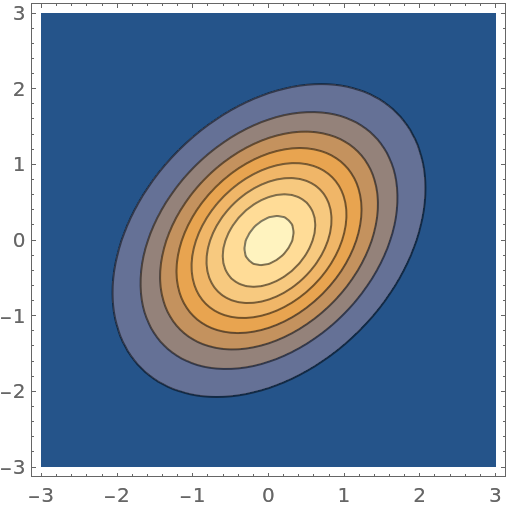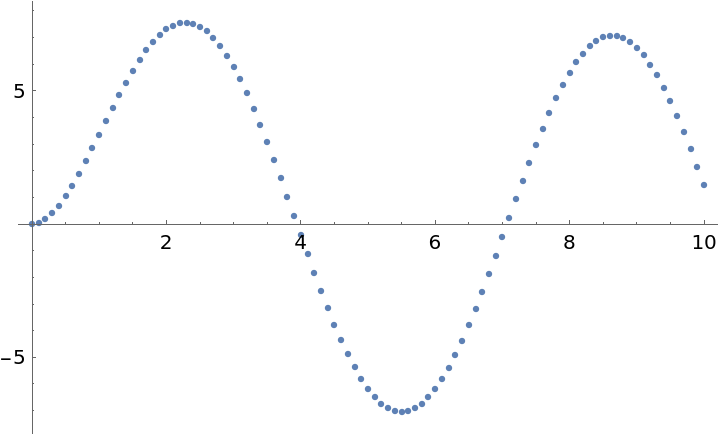Wolfram Function Repository
Instant-use add-on functions for the Wolfram Language
Function Repository Resource:
An operator form of ExpressionToFunction that can be applied to expressions
ResourceFunction["ExpressionToFunctionOperator"][var1,var2,…][expr] returns Function[{var1,var2,…},expr]. | |
ResourceFunction["ExpressionToFunctionOperator"][…,{vari,1,vari,2,…},…][expr] bundles {vari,1,vari,2,…} together in one function slot as a vector argument. | |
ResourceFunction["ExpressionToFunctionOperator"][varspec1→index1,varspec2→index2,…][expr] binds variables specified by varspeci to Slot[indexi]. |
Create a function from a simple polynomial:
| In[1]:= |
|
| Out[1]= |
|
Evaluate the polynomial at a given value:
| In[2]:= |
|
| Out[2]= |
|
Convert a multivariate PDF to a function:
| In[3]:= |
|
| Out[3]= |
|
| In[4]:= |
|
| Out[4]= |
|
| In[5]:= |
|
| Out[5]= |
|
Bind x and y to the first slot of the function as a vector:
| In[6]:= |
|
| Out[6]= |
|
| In[7]:= |
|
| Out[7]= |
|
Bind arguments to keys in an Association:
| In[8]:= |
|
| Out[8]= |
|
| In[9]:= |
|
| Out[9]= |
|
Bind multiple symbols to a single slot:
| In[10]:= |
|
| Out[10]= |
|
| In[11]:= |
|
| Out[11]= |
|
| In[12]:= |
|
| Out[12]= |
|
Combine named slots with positional slots:
| In[13]:= |
|
| Out[13]= |
|
| In[14]:= |
|
| Out[14]= |
|
Use the Attributes option to return a function that holds its arguments:
| In[15]:= |
|
| Out[15]= |
|
| In[16]:= |
|
| Out[16]= |
|
| In[17]:= |
|
| Out[17]= |
|
| In[18]:= |
|
| Out[18]= |
|
By default, the function body remains unevaluated:
| In[19]:= |
|
| Out[19]= |
|
Use Evaluated→True to evaluate the PDF:
| In[20]:= |
|
| Out[20]= |
|
When x has a value, using Evaluate directly on the first argument gives the wrong result:
| In[21]:= |
|
| Out[21]= |
|
Use Evaluated → True to Block x while the body is being evaluated:
| In[22]:= |
|
| Out[22]= |
|
Group x and y together as a vector argument and map over a list of points:
| In[23]:= |
|
| Out[23]= |
|
| In[24]:= |
|
| In[25]:= |
|
| In[26]:= |
|
| Out[26]= |

|
Add a parameter of the PDF as an argument:
| In[27]:= |
![parameterizedPDF = ResourceFunction["ExpressionToFunctionOperator"][{x, y},
\[Rho],
Evaluated -> True
][PDF[BinormalDistribution[\[Rho]], {x, y}]]](https://www.wolframcloud.com/obj/resourcesystem/images/179/1795a6e4-a2c3-4693-90aa-036b21bb0696/4e9301d12434e5c7.png)
|
| Out[27]= |

|
| In[28]:= |
|
| Out[28]= |
|
Convert the solution of a differential equation to a function:
| In[29]:= |
|
| Out[29]= |
|
| In[30]:= |
|
| Out[30]= |
|
| In[31]:= |
|
| Out[31]= |
|
Represent the function at parameter value a=10 with OperatorApplied, then map over a range of x values:
| In[32]:= |
![AssociationMap[
OperatorApplied[dSolveFun][10],
Range[0, 10, 0.1]
] // ListPlot](https://www.wolframcloud.com/obj/resourcesystem/images/179/1795a6e4-a2c3-4693-90aa-036b21bb0696/6c4bbdbd3705a174.png)
|
| Out[32]= |

|
ExpressionToFunctionOperator has the exact same functionality as the resource function ExpressionToFunction, but is used in operator form:
| In[33]:= |
|
| Out[33]= |
|
| In[34]:= |
|
| Out[34]= |
|
Note, in particular, that both functions hold the expression that's being transformed into a function unless Evaluated→True is used:
| In[35]:= |
|
| Out[35]= |
|
| In[36]:= |
|
| Out[36]= |
|
With evaluation of the expression:
| In[37]:= |
|
| Out[37]= |
|
| In[38]:= |
|
| Out[38]= |
|
ExpressionToFunctionOperator is meant for expressions that do not already contain functions and may malfunction for such expressions if the replacement variables exist inside such functions:
| In[39]:= |
|
| Out[39]= |
|
| In[40]:= |
|
| Out[40]= |
|
The correct result would be:
| In[41]:= |
![ReleaseHold[
Hold[Function[#1 + x]@y] /. {x -> x0, y -> y0}
]](https://www.wolframcloud.com/obj/resourcesystem/images/179/1795a6e4-a2c3-4693-90aa-036b21bb0696/24a7d3daf006de83.png)
|
| Out[41]= |
|
The problem can sometimes be avoided by evaluating the inner function away:
| In[42]:= |
|
| Out[42]= |
|
This work is licensed under a Creative Commons Attribution 4.0 International License